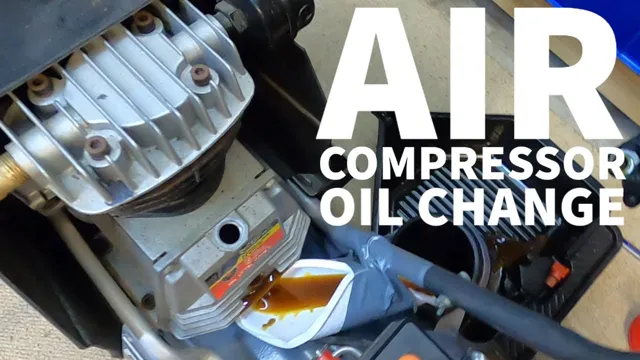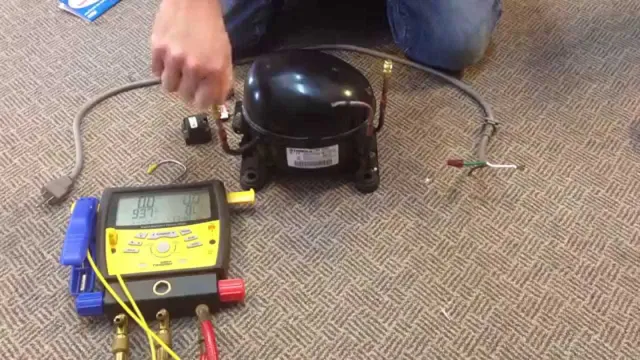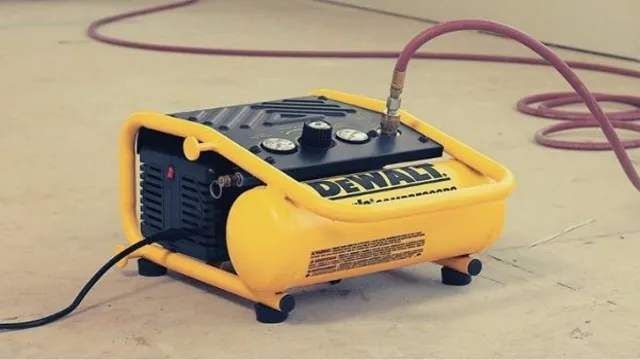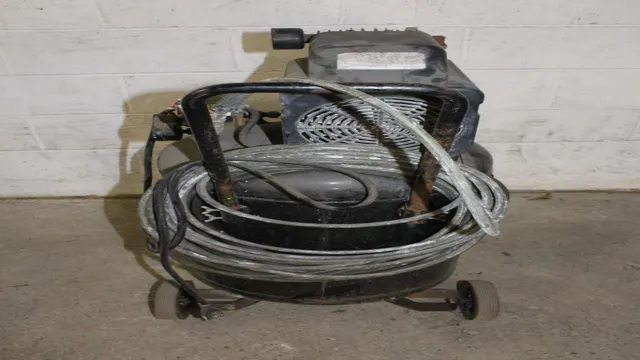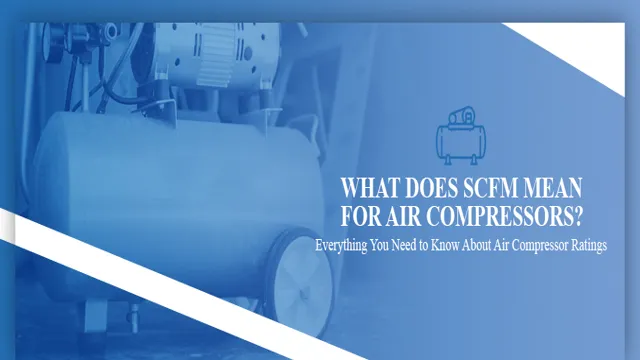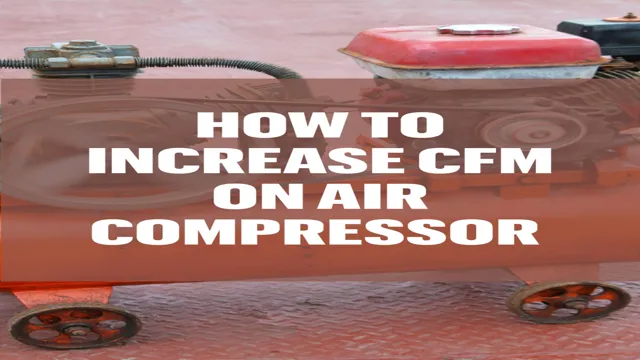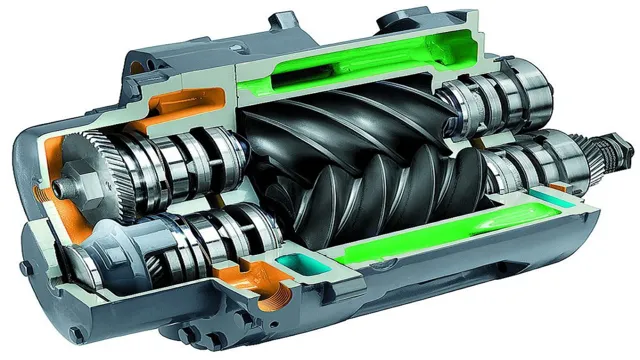How to Improve Air Compressor Efficiency: Tips and Tricks for Maximum Performance

When it comes to keeping your air compressor working effectively, efficiency is key. Not only does improving air compressor efficiency lead to cost savings, but it also helps to prolong the lifespan of your equipment. There are a variety of tips and tricks that you can use to enhance the efficiency of your air compressor, from regular maintenance to optimal placement.
By following these simple steps, you can ensure that your air compressor is running smoothly and effectively. So, whether you’re a seasoned compressor expert or a newbie to the industry, keep reading to learn more about improving air compressor efficiency and keeping your equipment in top-notch condition.
Understanding Your Air Compressor
Air compressors are essential tools used in many modern industries, and keeping them running efficiently is crucial. If you want to improve your air compressor efficiency, there are several things you can do. Firstly, make sure to keep your air filters clean and replace them regularly.
This will help your compressor run smoother and more efficiently by reducing dust and other particles that can cause clogs in the system. You should also check for leaks in your air hoses, connectors, and other components, as these can lead to wasted air and decreased efficiency. Using the right oil for your compressor can also help improve its efficiency.
Properly maintaining your air compressor is essential to keep it running smoothly and efficiently, reducing costly downtime and increasing productivity.
Identifying the Right Compressor for Your Needs
When it comes to finding the right air compressor, it’s important to first understand what exactly you need. Are you using it for a small DIY project at home or for heavy-duty construction work? The type of compressor you’ll require will depend on the nature of your tasks. It’s essential to consider factors such as CFM (cubic feet per minute), PSI (pounds per square inch), and tank capacity.
CFM refers to the air volume output, while PSI measures the amount of pressure produced. These factors will ultimately determine the amount of power your compressor will provide. Moreover, it’s important to keep in mind the size of the tank, as it ensures consistent airflow.
You don’t want to run out of compressed air halfway through your project. By understanding your specific needs, you’ll be able to make an informed decision and invest in the right compressor for you.

Checking for Air Leaks and Obstructions
When it comes to using an air compressor, it’s important to understand the inner workings of the machine. One crucial element to keep in mind is checking for air leaks and obstructions. Air leaks can occur in various parts of the compressor, such as the hoses, fittings, and valves.
These leaks can diminish the amount of compressed air available and lead to decreased performance and efficiency. Similarly, obstructions such as debris or build-up within the machine can also impede the airflow. This not only reduces the amount of air reaching your tools but also puts added strain on the compressor’s motor and other components.
To ensure optimal performance, it’s important to regularly check for air leaks and obstructions, making any necessary repairs or cleaning as needed.
Maintaining Your Air Compressor
If you want to improve the efficiency of your air compressor, there are a few things you should keep in mind. First, make sure you keep up with your regular maintenance tasks, such as changing the oil and air filters on a regular basis. This will help keep your compressor running smoothly and reduce the risk of breakdowns or costly repairs.
Additionally, consider investing in high-quality parts and accessories, as these can help improve efficiency and performance. Finally, make sure you’re using your compressor correctly and in accordance with the manufacturer’s instructions. This means avoiding overloading it, monitoring the pressure levels, and ensuring proper ventilation.
By following these tips, you can help ensure your air compressor is operating as efficiently as possible, which can lead to cost savings and improved productivity in the long run.
Keeping Your Equipment Clean and Lubricated
Maintaining Your Air Compressor: Tips for Keeping Your Equipment Clean and Lubricated An air compressor is an essential tool that can be used for various applications, including powering pneumatic tools and inflating tires. To ensure the efficiency and longevity of your air compressor, it’s vital to keep it well-maintained and lubricated. One of the simplest ways to keep your air compressor in great shape is by cleaning it regularly.
Dust and debris can accumulate in the motor and other components, causing them to wear out faster. Use a soft-bristle brush and a mild cleaning solution to wipe down the unit regularly. You should also lubricate the air compressor’s moving parts, especially the piston and cylinder, to prevent friction and extend its lifespan.
Choose the right type of oil for your unit, and follow the manufacturer’s instructions for oil changes. Regularly checking and replacing damaged parts, such as hoses and filters, can also help keep your air compressor running smoothly. Remember, proper maintenance is the key to extending the lifespan of your air compressor and ensuring its peak performance.
Regularly Changing Air Filters and Oil
Maintaining your air compressor is vital to its longevity and functionality. One essential aspect of maintenance is regularly changing the air filters and oil. Air filters protect the compressor from dust, dirt, and debris that can damage its components, while oil helps lubricate and cool the system.
Neglecting to change these items can cause the compressor to overheat, leading to costly repairs or even replacement. Ideally, air filters should be changed every three months, while oil should be changed every 500 hours of use or at least once a year. It’s essential to use the correct type of filter and oil for your specific compressor to ensure optimal performance.
By keeping up with routine maintenance, you can avoid costly repairs and extend the life of your air compressor.
Monitoring Pressure and Temperature
Maintaining your air compressor is crucial to its longevity, and monitoring pressure and temperature are essential components of this process. By keeping track of these parameters, you can ensure that your compressor is running smoothly and efficiently. High temperatures and low pressures can cause damage to the compressor’s components and reduce its lifespan.
Therefore, it is important to use monitoring equipment to keep an eye on these values. Analogies can help explain the importance of monitoring pressure and temperature. Think of it like checking the oil level on your car – you wouldn’t want to run your engine on low oil and cause damage to your vehicle.
Likewise, you wouldn’t want to run your air compressor on inadequate pressure or high temperature and risk damaging it. So, be sure to make monitoring pressure and temperature a part of your regular maintenance routine to ensure that your air compressor runs smoothly and efficiently for years to come.
Maximizing Energy Efficiency
Improving air compressor efficiency is key to reducing energy consumption and costs. One way to do this is to regularly maintain the equipment by cleaning filters, checking for leaks, and keeping parts lubricated. Additionally, adjusting settings such as pressure and flow rate to match the specific application can optimize energy use.
Investing in energy-efficient equipment, such as variable-speed compressors, can also make a significant impact on energy usage. Lastly, implementing a control system that monitors performance and adjusts output accordingly can further improve efficiency. By taking these steps, businesses can not only save money on energy costs but also reduce their carbon footprint.
Remember that improving air compressor efficiency is a continuous process that requires ongoing attention, but the benefits are well worth it in the long run.
Investing in Variable Speed Drive Technology
Variable Speed Drive Technology Variable speed drive technology has become an increasingly popular and effective way to maximize energy efficiency in many industries. By controlling the speed of electric motors, variable speed drives can help reduce energy consumption, lower operational costs, and extend the lifespan of equipment. Moreover, these drives can be used in a wide variety of applications, from HVAC systems to conveyor belts.
Using variable speed drives can also help reduce carbon emissions, making them an environmentally friendly solution. In addition, implementing these drives can help companies achieve their sustainability goals and boost their overall efficiency. So, if you’re looking for an effective way to save on energy and costs, investing in variable speed drive technology may be worth considering.
Optimizing Your Air Compressor Location
If you’re looking to optimize your air compressor location and maximize energy efficiency, there are a few things to keep in mind. First and foremost, it’s important to choose a location that is well-ventilated and free of obstructions. This will help to ensure that your compressor can operate at maximum efficiency without overheating or experiencing other issues.
Additionally, you should consider the location of your compressor in relation to your other equipment and machinery. Keeping your compressor close to the areas where it will be used most frequently can help to minimize the distance that compressed air needs to travel, reducing energy waste and improving overall efficiency. Finally, it’s important to choose a compressor that is appropriately sized and designed for your specific needs.
By selecting a compressor that is matched to your specific application, you can ensure that you are getting the most out of your equipment and minimizing waste.
Conclusion and Next Steps
In conclusion, improving air compressor efficiency is like investing in your own personal superhero. It may require some initial effort and investment, but the long-term benefits are undeniable. From reducing energy costs to extending the lifespan of your equipment, the rewards of optimizing your compressor’s performance are unparalleled.
So don’t wait any longer – take the necessary steps to unleash the full potential of your air compressor and reap the rewards of a more efficient and reliable system. Your bottom line and your planet will thank you.”
FAQs
What are some common reasons for low air compressor efficiency?
Some common reasons for low air compressor efficiency include dirty air filters, leaks in the compressed air system, incorrect pressure settings, and outdated equipment.
How can I improve the airflow in my compressed air system?
You can improve the airflow in your compressed air system by ensuring that air filters are clean and not clogged, fixing any leaks in the system, and properly sizing the equipment for the desired airflow.
Is it important to perform routine maintenance on my air compressor?
Yes, routine maintenance on your air compressor is important to ensure optimal performance and efficiency. This can include tasks such as changing air filters, checking oil levels, and inspecting for any damage or leaks.
Can upgrading to a more efficient air compressor save money in the long run?
Yes, upgrading to a more efficient air compressor can save money in the long run due to reduced energy costs and increased productivity.
How can I determine the right size air compressor for my needs?
The size of your air compressor should be based on the amount of airflow you need, measured in cubic feet per minute (CFM). Consider factors such as the number of tools or equipment being used and the duration of use.
What is the role of a compressed air dryer in improving efficiency?
A compressed air dryer helps remove moisture from the compressed air system, which can help improve efficiency and reduce the risk of damage or corrosion to equipment.
Are there any best practices for maintaining optimal air compressor efficiency?
Yes, best practices for maintaining optimal air compressor efficiency include regular maintenance and cleaning, ensuring proper pressure settings, and addressing any issues or repairs promptly.

